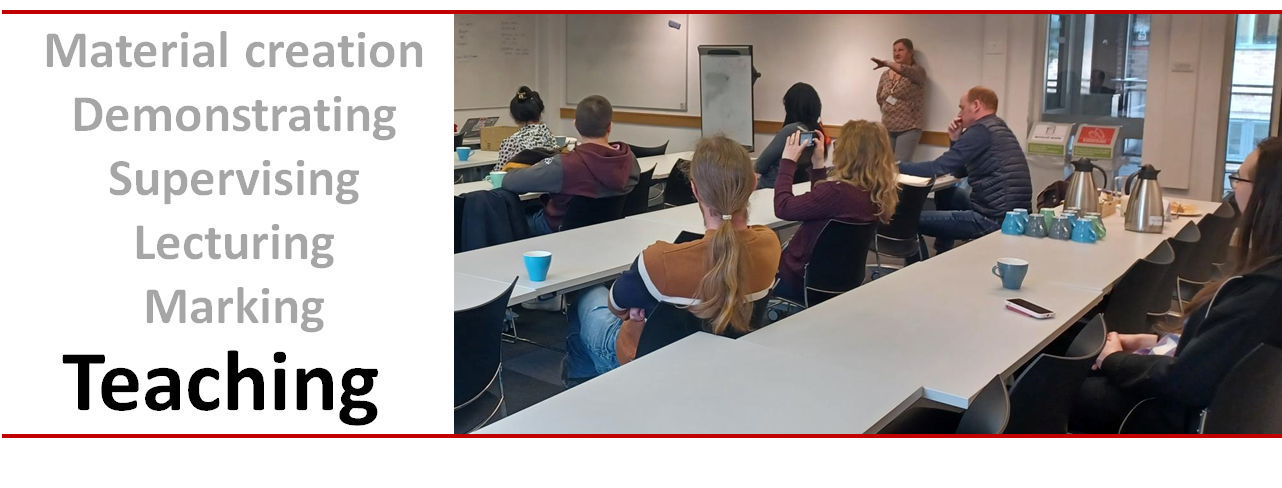 The last RSA event focused on the topic of teaching and highlighted very mixed opinions and diverse experiences. For some researchers, the opportunities are scarce or non-existent, and for others, the opportunities are less opportunities and more an obligation. Gaining teaching experience is essential for those working towards becoming a lecturer. However, for researchers not wanting to take that path, it may not be a priority.
The last RSA event focused on the topic of teaching and highlighted very mixed opinions and diverse experiences. For some researchers, the opportunities are scarce or non-existent, and for others, the opportunities are less opportunities and more an obligation. Gaining teaching experience is essential for those working towards becoming a lecturer. However, for researchers not wanting to take that path, it may not be a priority.
Researchers across the university shared their experience on the topic, reporting drastically different opportunities and approaches between departments. This is further complicated by differences in restrictions due to funding sources. In some departments, there are no teaching opportunities available to research staff, often due to lack of teaching certification or quality of teaching worries whereas elsewhere in the university, researchers and PhD students are relied upon for teaching, none of which are certified as teachers.
Commonly it seems, the “opportunities” given are limited to just marking in some departments with perhaps some demonstrating in others, which does not make a well-rounded teacher. In particular, lecturing opportunities seem to be very limited. A “research associate” is a development role, and there should be systems in place to offer diverse opportunities to be able to develop a good quality of experience. Research staff are able to take 10 development days each year under the Concordat agreement, and although the time taken for teaching experience may need to be limited, to enable you to focus on your research without it becoming a burden, you should have power over your development. There are obviously some logistics and constraints to making this work, for example committing to a whole module for consistency, which might result in a significant time commitment, but again that should be your choice to make.
There was some particular friction around The Associate Teacher Programme (ATP) in certain departments. In more than one case, previous teacher training and experience has been neglected, meaning that researchers had to repeat the same qualification before being able to teach. This programme requires a minimum of 10 hours of teaching which some departments were reluctant to assign. One person in particular struggled to get the teaching hours set up before joining the course so joined regardless of the departments reluctance and then told the teaching office that they now required the hours. Although this worked, it seems unnecessary to need this sort of leverage or confrontation.
There was also tension around teaching quality being deemed as “too important” and therefore research staff not being given opportunities to lecture. Obviously high-quality delivery of content is expected for the students and a high priority for us all, but is there a reason why researchers can’t deliver a lecture that is on one of the non-examined or non-accredited topics, particularly on a topic related to their research? After speaking to a director of teaching there seemed to be wiggle room on this and as long as the module organiser approves the slides and sits in on the lecture then it should be possible.
All this being said, there were positive experiences reported. One department recently opened up supervision of master’s research projects to experienced researchers, with them officially recognised as the sole supervisor. This is not obligatory, but a choice by the researcher and the line manager. Additionally, official recognition has been given to a couple of researchers across the university as a co-supervisor of a PhD project, a task which is often undertaken by researchers but without official recognition.
There is more that can be done to pave the way to a good balance of teaching opportunities and obligations. There will always be more, but the highest priorities given by researchers at Lancaster University during the Easter event mostly fall down to two things, recognition and clarity.
Recognition
- Being able to officially supervise PhD students and get the recognition for it
- Recognise teaching and mentorships on PURE
- Recognition for past work with students or previous qualifications
Clarity
- Clarity on what is available in terms of teaching opportunities in the department, from the start
- Training to provide clarity on how to set out projects for future supervisors
- Clear career paths to teaching and lecturing
- Clarity over teaching certificate expectations
On each of these points there needs to be an openness between departments and research staff, and as far as possible equality of opportunity between departments. Some of the points above may not be so simple from a departments point of view, and that is ok – if it is explained why. There also needs to be a willingness on the part of research staff to see where the opportunities are and work around any constraints. It is in your best interest so you are the most motivated person to see what can be changed. These changes are sometimes simply a result of a single conversation with the right person who is willing to listen. If you haven’t yet found that person, keep looking! Other times these changes are slow and creep in one direction over many conversations, over many years.
Please get in touch with us (rsa@lancaster.ac.uk)and tell us what your experience has been with teaching, both positive and negative. Knowing more about good practice in certain departments could act as leverage for research staff in those departments which are not quite doing as well!
